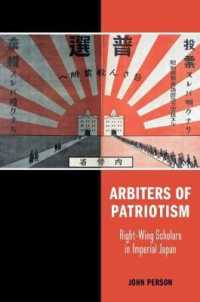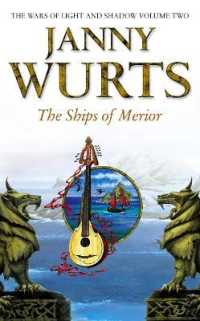- ホーム
- > 洋書
- > 英文書
- > History / World
基本説明
Addressing the many and rich connections between political and religious dissent in the long eighteenth century, the volume also acknowledges the work of Professor James E. Bradley in stimulating interest in these issues among scholars.
Full Description
The idea of the long eighteenth century (1660-1832) as a period in which religious and political dissent were regarded as antecedents of the Enlightenment has recently been advanced by several scholars. The purpose of this collection is further to explore these connections between religious and political dissent in Enlightenment Britain. Addressing the many and rich connections between political and religious dissent in the long eighteenth century, the volume also acknowledges the work of Professor James E. Bradley in stimulating interest in these issues among scholars. Contributors engage directly with ideas of secularism, radicalism, religious and political dissent and their connections with the Enlightenment, or Enlightenments, together with other important themes including the connections between religious toleration and the rise of the 'enlightenments'. Contributors also address issues of modernity and the ways in which a 'modern' society can draw its inspiration from both religion and secularity, as well as engaging with the seventeenth-century idea of the synthesis of religion and politics and its evolution into a system in which religion and politics were interdependent but separate. Offering a broadly-conceived interpretation of current research from a more comprehensive perspective than is often the case, the historiographical implications of this collection are significant for the development of ideas of the nature of the Enlightenment and for the nature of religion, society and politics in the eighteenth century. By bringing together historians of politics, religion, ideas and society to engage with the central theme of the volume, the collection provides a forum for leading scholars to engage with a significant theme in British history in the 'long eighteenth century'.
Contents
List of Contributors, Acknowledgements, James E. Bradley: An Appreciation, Introduction, Part I. Accommodating Religious Heterodoxy, 1. Why the Third Fell Out: Trinitarian Dissent, 2. The Bowman Affair: Latitudinarian Theology, Anti-clericalism and the Limits of Orthodoxy in Early Hanoverian England, 3. Enlightened Thought Devised from Biblical Principles, 4. Philip Doddridge and the Formulation of Calvinistic Theology in an Era of Rationalism and Deconfessionalization, 5. 'The Weight of Historical Evidence': Conyers Middleton and the Eighteenth-Century Miracles Debate, 6. Varieties of Heterodoxy: The Career of Edward Evanson (1731-1805), Part II. Religion, Politics and Society, 7. Dissenters, Anglicans and Elections after the Toleration Act, 1689-1710, 8. Politics and the Lay Baptism Controversy in England, 1708-15, 9. Religious Dissent, the Church, and the Repeal of the Occasional Conformity and Schism Acts, 1714-19, 10. Archbishop Markham and Political Preaching in Wartime England, 1776-77, 11. The Changing Legacy and Reception of John Foxe's 'Book of Martyrs' in the 'Long Eighteenth Century': Varieties of Anglican, Protestant and Catholic Response, c. 1760-c. 1850 219, Index








